greatsolutions
Expertise in Nursing, Mathematics, History, Psychology, Economics, Biology etc,. My Work contains the latest, updated Exam Solutions, Study Guides, Notes 100% verified Guarantee Top Grades.
- 4089
- 0
- 95
Community
- Followers
- Following
51 Reviews received
4193 items
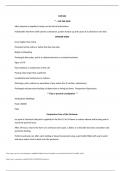
NUR166 Notes spring 2023 verified
UR166 ** = ON THE QUIZ After placenta is expelled, fundus can be felt at belly button. Full bladder interferes with uterine contraction, pushes fundus up and causes it to deviate to one side. DANGER SIGNS Fever higher than 100.4. Persistent lochia rubra or lochia that has foul odor Bright red bleeding Prolonged after pains, pelvic or abdominal pains or constant backache Signs of UTI Pain, Redness or tenderness of the calf Passing clots larger than a golf ball Localized breast tendern...
- Other
- • 4 pages •
UR166 ** = ON THE QUIZ After placenta is expelled, fundus can be felt at belly button. Full bladder interferes with uterine contraction, pushes fundus up and causes it to deviate to one side. DANGER SIGNS Fever higher than 100.4. Persistent lochia rubra or lochia that has foul odor Bright red bleeding Prolonged after pains, pelvic or abdominal pains or constant backache Signs of UTI Pain, Redness or tenderness of the calf Passing clots larger than a golf ball Localized breast tendern...
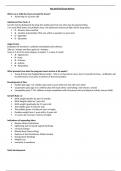
Nur166 Final Exam Review Questions and Answers
Nur166 Final Exam Review When can a child do chores around the house? School Age (6-12 years old) Adolescent Pace Tool x 3 Use this tool to distinguish the drug-free adolescent from one who may be experimenting. 2 or more PACE letters are problem areas, the adolescent may be at high risk for drug abuse. P – Parents, Peers and Pot A – Alcohol, Automobiles (This one will be a question on your test) C - Cigarettes E – Education Apgar Scores Evaluates the newborn...
- Exam (elaborations)
- • 10 pages •
Nur166 Final Exam Review When can a child do chores around the house? School Age (6-12 years old) Adolescent Pace Tool x 3 Use this tool to distinguish the drug-free adolescent from one who may be experimenting. 2 or more PACE letters are problem areas, the adolescent may be at high risk for drug abuse. P – Parents, Peers and Pot A – Alcohol, Automobiles (This one will be a question on your test) C - Cigarettes E – Education Apgar Scores Evaluates the newborn...
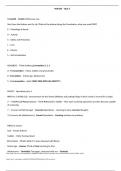
NUR166 Quiz 3 Review Questions and Answers (Verified Answers)
NUR166 – Quiz 3 MASLOW – PASLES (Think Low, Les) Start from the Bottom and Go Up (Think of the bottom being the Foundation, what you need FIRST) P – Physiological Needs A – Activity S – Safety and Protection L – Love E – Esteem S – Self Actualization KOHLBERG – Think Kohlberg Convention 3, 2, 1 3 - Preconvention – Infant, toddler and preschooler 2 - Convention – School age, Adolescence 1 - Postconvention – Adult (ONLY ONE WITH AN ADULT!!!) PIAGET – Operatio...
- Exam (elaborations)
- • 2 pages •
NUR166 – Quiz 3 MASLOW – PASLES (Think Low, Les) Start from the Bottom and Go Up (Think of the bottom being the Foundation, what you need FIRST) P – Physiological Needs A – Activity S – Safety and Protection L – Love E – Esteem S – Self Actualization KOHLBERG – Think Kohlberg Convention 3, 2, 1 3 - Preconvention – Infant, toddler and preschooler 2 - Convention – School age, Adolescence 1 - Postconvention – Adult (ONLY ONE WITH AN ADULT!!!) PIAGET – Operatio...
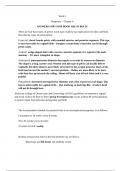
Nur166 Week 1 Pre-Class Assignment
Week 1 Pregnancy – Chapter 4 ANSWERS FOR YOUR BOOK ARE IN BOLD! There are four basic types of pelves. Each type of pelvis has implications for labor and birth. Describe the types of pelves below: Gynecoid: classic female pelvis, with rounded anterior and posterior segments. This type is most favorable for vaginal birth – Imagine a round baby’s head that can fit through pretty easily. Android: wedge-shaped inlet with a narrow anterior segment; it is typical of the male anatomy – ...
- Exam (elaborations)
- • 25 pages •
Week 1 Pregnancy – Chapter 4 ANSWERS FOR YOUR BOOK ARE IN BOLD! There are four basic types of pelves. Each type of pelvis has implications for labor and birth. Describe the types of pelves below: Gynecoid: classic female pelvis, with rounded anterior and posterior segments. This type is most favorable for vaginal birth – Imagine a round baby’s head that can fit through pretty easily. Android: wedge-shaped inlet with a narrow anterior segment; it is typical of the male anatomy – ...
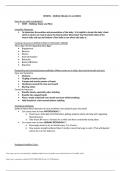
REVIEW Weeks 3-5 NUR166 Questions & Answers 100% Correct
REVIEW – NUR166 (Weeks 3-6 on EXAM) How do we avoid constipation? WWF – Walking, Water and Fiber Leopold’s Maneuver To determine the position and presentation of the baby. It is helpful to locate the baby’s back which is where we need to place the fetal monitor (Heartrate) You’ll feel both sides of the mom’s belly and top and bottom of her belly to see where the baby is. Cardinal Movements (KNOW THESE IN THIS EXACT ORDER) “Every Darn Fool In Egypt Eats Raw Eggs” ...
- Other
- • 5 pages •
REVIEW – NUR166 (Weeks 3-6 on EXAM) How do we avoid constipation? WWF – Walking, Water and Fiber Leopold’s Maneuver To determine the position and presentation of the baby. It is helpful to locate the baby’s back which is where we need to place the fetal monitor (Heartrate) You’ll feel both sides of the mom’s belly and top and bottom of her belly to see where the baby is. Cardinal Movements (KNOW THESE IN THIS EXACT ORDER) “Every Darn Fool In Egypt Eats Raw Eggs” ...
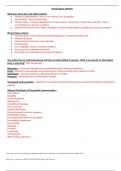
Nur163 Exam 2 Review Questions and Answers 100% Correct
Nur163 Exam 2 Review What does stress do to the elderly patient? Changes in Eating Patterns, such as over-eating or loss of appetite. Mood Swings – increased irritability Memory Issues – Increased forgetfulness of names, places, things that normally come naturally. Lack of concentration may become a problem. Isolation of themselves from others, refusing to socialize or participate in activities they previously enjoyed. Physical Signs of Stress Increased pulse, inc...
- Exam (elaborations)
- • 9 pages •
Nur163 Exam 2 Review What does stress do to the elderly patient? Changes in Eating Patterns, such as over-eating or loss of appetite. Mood Swings – increased irritability Memory Issues – Increased forgetfulness of names, places, things that normally come naturally. Lack of concentration may become a problem. Isolation of themselves from others, refusing to socialize or participate in activities they previously enjoyed. Physical Signs of Stress Increased pulse, inc...
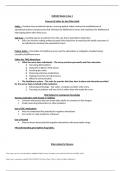
NUR 163 Notes Week 3 Day 1 Safety in Older Adults.
NUR163 Week 3, Day 1 Concept of Safety for the Older Adult Safety – Freedom from accidental injuries, ensuring patient safety involves the establishment of operational systems and processes that minimize the likelihood of errors and maximizes the likelihood of intercepting them when they occur. Safe Care – Avoiding injuries to patients from the care that is intended to help them. Safe Care involves making evidence based clinical decisions to maximize the health outcomes of an indi...
- Exam (elaborations)
- • 4 pages •
NUR163 Week 3, Day 1 Concept of Safety for the Older Adult Safety – Freedom from accidental injuries, ensuring patient safety involves the establishment of operational systems and processes that minimize the likelihood of errors and maximizes the likelihood of intercepting them when they occur. Safe Care – Avoiding injuries to patients from the care that is intended to help them. Safe Care involves making evidence based clinical decisions to maximize the health outcomes of an indi...
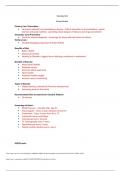
NUR163 Exam Review 1 Answers 100% Correct
Nursing 163 Exam Review Primary Care /Prevention – To protect patients from developing a disease. Patient education on immunizations, regular exercise and good nutrition, counseling about dangers of tobacco and drugs and alcohol. Secondary Care/Prevention – Catch the disease/diagnosis. Screenings for those with risk factors for illness. Tertiary Care – Treating/Stopping progression (Cardiac Rehab) Benefits of Diet Better Health Disease prevention Healing...
- Exam (elaborations)
- • 9 pages •
Nursing 163 Exam Review Primary Care /Prevention – To protect patients from developing a disease. Patient education on immunizations, regular exercise and good nutrition, counseling about dangers of tobacco and drugs and alcohol. Secondary Care/Prevention – Catch the disease/diagnosis. Screenings for those with risk factors for illness. Tertiary Care – Treating/Stopping progression (Cardiac Rehab) Benefits of Diet Better Health Disease prevention Healing...
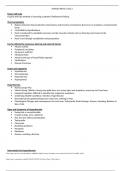
NUR 163 Notes Week 3, Day 2study guide notes
NUR163 Week 3, Day 2 Morse Fall Scale A quick and easy method of assessing a patient’s likelihood of falling. Thermoregulation Balance between heat production mechanisms and heat loss mechanisms that occur to maintain a constant body temp. Controlled by hypothalamus Heat is produced by metabolic processes and by muscular activity such as shivering and conserved by vasoconstriction Heat is lost through vasodilation and perspiration Can be affected by numerous internal ...
- Exam (elaborations)
- • 3 pages •
NUR163 Week 3, Day 2 Morse Fall Scale A quick and easy method of assessing a patient’s likelihood of falling. Thermoregulation Balance between heat production mechanisms and heat loss mechanisms that occur to maintain a constant body temp. Controlled by hypothalamus Heat is produced by metabolic processes and by muscular activity such as shivering and conserved by vasoconstriction Heat is lost through vasodilation and perspiration Can be affected by numerous internal ...
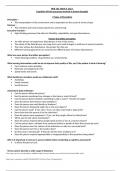
NUR 163 Notes Week 4 Cognition 100% ACCURATE study guide
NUR 163, Week 4, Day 1Cognition (All the processes involved in human thought)3 Types of PerceptionPerception -The interpretation of the environment and is dependent on the acuity of sensory input.Memory -The retention and recall of past experiences and learning.Executive Function -High thinking processes that allow for flexibility, adaptability, and goal directedness.Factors that affect perceptionAn older person can experience disturbances in any of the senses.The extent of the di...
- Exam (elaborations)
- • 3 pages •
NUR 163, Week 4, Day 1Cognition (All the processes involved in human thought)3 Types of PerceptionPerception -The interpretation of the environment and is dependent on the acuity of sensory input.Memory -The retention and recall of past experiences and learning.Executive Function -High thinking processes that allow for flexibility, adaptability, and goal directedness.Factors that affect perceptionAn older person can experience disturbances in any of the senses.The extent of the di...

Applied Pathophysiology for the Advanced Practice Nurse, First EditionLucie Dlugasch, Lachel StoryChapter 1 Assessment Quiz
COUC 670 Quiz Version 1 - Integration Study Guide spring 2022/23
SPCE 609 Quiz 1 -question and answers study guide 2023 latest
Assignment 3 Reliability & Validity in Research Instruments well answersed
Adult Medical Surgical Edition 11.0 ATI purple book is the one we are using and all questions are coming from there. My exam is on Immunity, Infection, Inflammation , care of patients with HIV, Cancer, hypersensitivity, autoimmunity, burns , wounds, psori